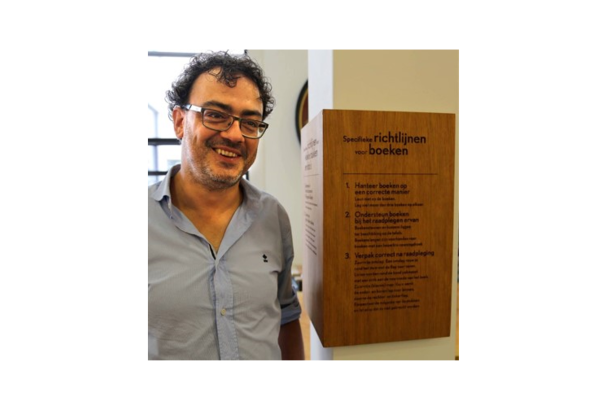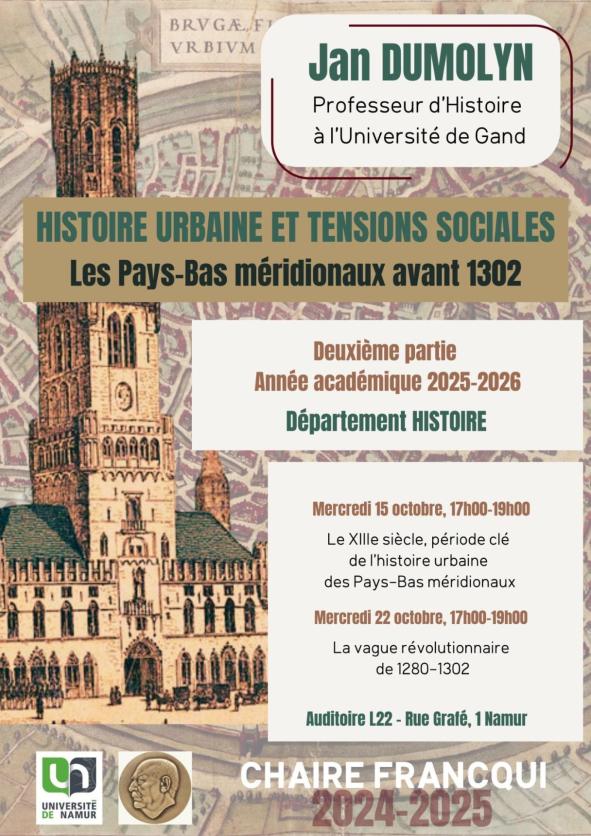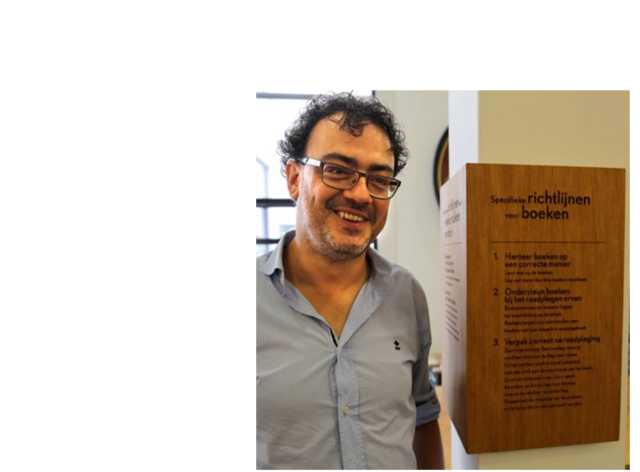As part of the Francqui 2025 Chair, the Department of History welcomes Prof. Jan Dumolyn (Ghent University) for a series of lessons on the theme "Urban history and social tensions - The Southern Netherlands before 1302."
12/03/2025 | 18h-20h - Leçon inaugurale - "Een canon, een verhaal en de kritiek".
The popularization of "national" history in Belgium and Flanders.
All lessons will take place in auditorium L12, Faculté de Philosophie et Lettres, rue Grafé, 1 - 5000 Namur.

Prof. Jan Dumolyn | Biography
Jan Dumolyn, born in Bruges on August 25, 1974, obtained a BA in History from Ghent University in 1995 and a PhD in History in 2001. He is Professor of Medieval History at Ghent University and President of the Institut d'Etudes Médiévales Henri Pirenne.
He is internationally known for his research on medieval uprisings, but has also published on various other aspects of medieval town history in the Southern Netherlands. As part of his research, he often collaborates with archaeologists, art historians and literary historians.
Jan Dumolyn is also known to the general public in Dutch-speaking Belgium as a member of the committee of experts who drew up the "Flemish Canon" and for his contribution to the TV series "Het verhaal van Vlaanderen". An essayist on history and heritage topics for the newspaper De Standaard, he has also taken part in the production of exhibitions, including "Van Eyck, an optical revolution" at Ghent's Museum of Fine Arts in 2020.


The program
Wednesday 12/03/2025 - 18h-20h - Inaugural lesson | "Een canon, een verhaal en de kritiek". Popularizing "national" history in Belgium and Flanders
Between 2020 and 2024, Flanders was captivated by a public debate around history. The Flemish government's decision to have a "Flemish Canon" drawn up by a commission of experts, of which Jan Dumolyn was a member, and the particularly popular TV program "Het verhaal van Vlaanderen" sparked heated controversy. Some historians reacted very critically, while others took part in these initiatives. This inaugural session proposes to place the discussion in a broader, longer-term perspective, bearing in mind that a tension between "Belgian history" and "Flanders history" has existed since 1830, indeed even before the creation of Belgium.
Thursday 27/03/2025 - 8:30am-10:30am - Lesson 1 | Economic growth and urbanization in the Southern Netherlands in the early Middle Ages: a reconsideration
During the period between around 1050 and 1350, Europe experienced the strongest pre-industrial economic growth before the Industrial Revolution of the 18th century. There are few figures available to quantify this development, but all specialists agree that this period of economic growth was stronger in the southern Netherlands, as in northern and central Italy, than anywhere else in Europe, and that it certainly saw a greater degree of urbanization. This old problem will be systematically re-examined with the aim of clarifying chronology as well as causal mechanisms.
Thursday, April 3, 2025 - 8:30-10:30 am - Lesson 2 | Flanders' Forgotten Communal Movement
In recent years, much attention has been paid to urban uprisings in the Southern Netherlands, but the focus has always been on the late Middle Ages. The earlier period, known as the communal movement (between around 1050 and 1150), during which the first urban communities acquired greater legal and political autonomy, often remains in the shadows. This phase has long been downplayed as far as the county of Flanders is concerned, where communes barely existed. However, a re-examination of the sources shows a completely different picture.
Wednesday, October 15, 5pm-7pm (L22) - Lesson 3 | The 13th century, a key period in the urban history of the Southern Netherlands
In recent decades, little systematic research has been carried out into the development of towns in the Southern Netherlands in the 13th century. Recent perspectives focus almost exclusively on the late Middle Ages. Yet the 13th century was the most crucial period for the urbanization of these regions. At no other time did the urban population grow so rapidly, urban space take such a clear shape, and social tensions between rich and poor grew so much.
Wednesday, October 22, 5pm-7pm (L22) - Session 4 | The revolutionary wave of 1280-1302
For most people, certainly in Flanders today, the year 1302 immediately conjures up the Battle of Kortrijk and the victory of the "Flemings" over the army of French knights. This is obviously linked to the fact that July 11, the day of this battle, has become the national holiday of the Flemish Community. But in reality, the uprisings of those years, those in Bruges and Ghent in particular, were part of a much broader social movement whose origins go back to the 1280s and which also spread to Brabant, Liège and other regions.


